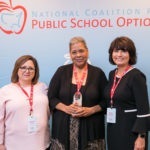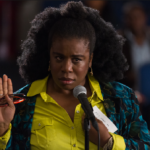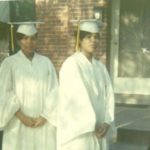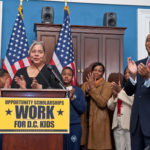
Ford, center, was described as a “tireless advocate for school choice”; Photo by Jason Dixson Photography: www.jasondixson.com
The school choice advocate was surprised with the award in Washington D.C.
July 31, 2019
Little Rock, Ark. — Educational opportunity advocate Virginia Walden Ford was recently recognized with the first-ever Lifetime Achievement Award from the National Coalition for Public School Options (PSO). Ford was a keynote speaker at the organization’s annual Parent Conference held in Washington D.C., where she was surprised with the award. Ford was asked to attend the annual event as part of an Advocacy Bootcamp for parents.
“For decades Virginia Walden Ford has fought for those who have the most at stake in our education system: The children. From her advocacy for school choice in the D.C. school system, to her work at the national level to create the first ever Opportunity Scholarships for low-income children, Ms. Ford has never shied away from fighting for families,” said Colleen Cook, PSO Board President.
“Still today – decades after her own children have grown – Ms. Ford carries the torch. It’s for these reasons that Public School Options was proud to present her with our first ever Lifetime Achievement Award. Thank you, Ms. Ford, for all you have done and continue to do for the families of America.”
About Virginia Walden Ford
Virginia Walden Ford is a leading advocate for improved educational opportunities in America’s schools, especially for low-income children. As a single parent, Virginia organized a group of parent advocates who demanded more school options for their children. That initiative led to the 2003 passage of the nation’s first-ever Opportunity Scholarship Program that benefited children in Washington, D.C. This program provides scholarships for low-income children to attend private schools, while boosting federal funding for traditional public schools and public charter schools. Since the program’s inception, thousands of students have received Opportunity Scholarships, and the program boasts a 91 percent high school graduation rate. Virginia continues to speak up for families and school choice programs nationwide and she is the subject of the 2019 film “Miss Virginia” starring Uzo Aduba, Matthew Modine, Vanessa Williams, Amirah Vann and Niles Fitch.
About the National Coalition for Public School Options
The National Coalition for Public School Options (PSO) is a national alliance of parents that supports and defends parents’ rights to access the best public school options for their children. The coalition supports the creation of public school options, including charter schools, online schools, magnet schools, open enrollment policies, and other innovative education programs. Additionally, we advocate for free and equal access without restrictions to these public schools for all children.
Learn more at PublicSchoolOptions.org.










